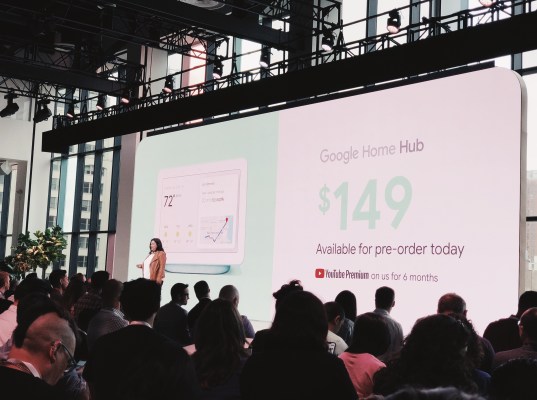Is Google finally taking consumers’ privacy concerns to heart? Today, the search and Android giant took the wraps off its $149 Home Hub, a new screen-based smart home device that lets you interact with Google services like Google Photos and connected smart home devices. It’s Google’s answer to the Amazon Echo Show and Facebook’s new Portal. But in this age of privacy, the company made an interesting feature choice: it will be shipping the first version of the device without a camera built in.
“We also consciously did not put a camera on so that it was comfortable to us in the private spaces of your home like your bedroom,” noted Diya Jolly, VP of product management in the presentation today, while going through other features on the device.
The feature — or lack thereof, as the case may be — is notable. Just yesterday, Facebook unveiled its own connected home screen device, the Portal, and Amazon has been working hard to push and update its Echo Show, its Alexa-powered home hub with a screen. Both Amazon and Facebook are focused on just now how to show images, but how to capture them and to use visual cues to build more intelligent services.
Google, it would seem, is taking a different approach: tech companies have been under the spotlight for how they are handling privacy these days, and Google’s decision to leave a camera out of this device plays into the idea of how tech companies are trying to be more sensitive to what users want — and maybe need, since we already have so many other devices with cameras on them.
For Google specifically, the timing is especially important: just this week the company announced that it would be shutting down Google+, its ill-fated social network that had a bug in it that exposed the private information of users. The optics — pun intended — of pushing out a new device with a camera on it, at a time when many wonder just how much information these smart home speakers are picking up, would look very bad indeed.
On the other hand, leaving a camera out could serve other ends for Google.
It helps it keep the cost of the device down, with $149 a very competitive price point.
It also could help Google keep this device from competing with others that it is pushing to users — specifically its phones, its new Pixel Slate tablet, which has a front-facing camera for video chat; and the Pixel Stand, which — when combined with the new Pixel 3 smartphone — essentially turns that device into a screen-based home hub that does have a camera.
Lastly, it helps Google start to build a roadmap for features that it could add into the main Home Hub product in later iterations, if it finds that users are requesting it.

